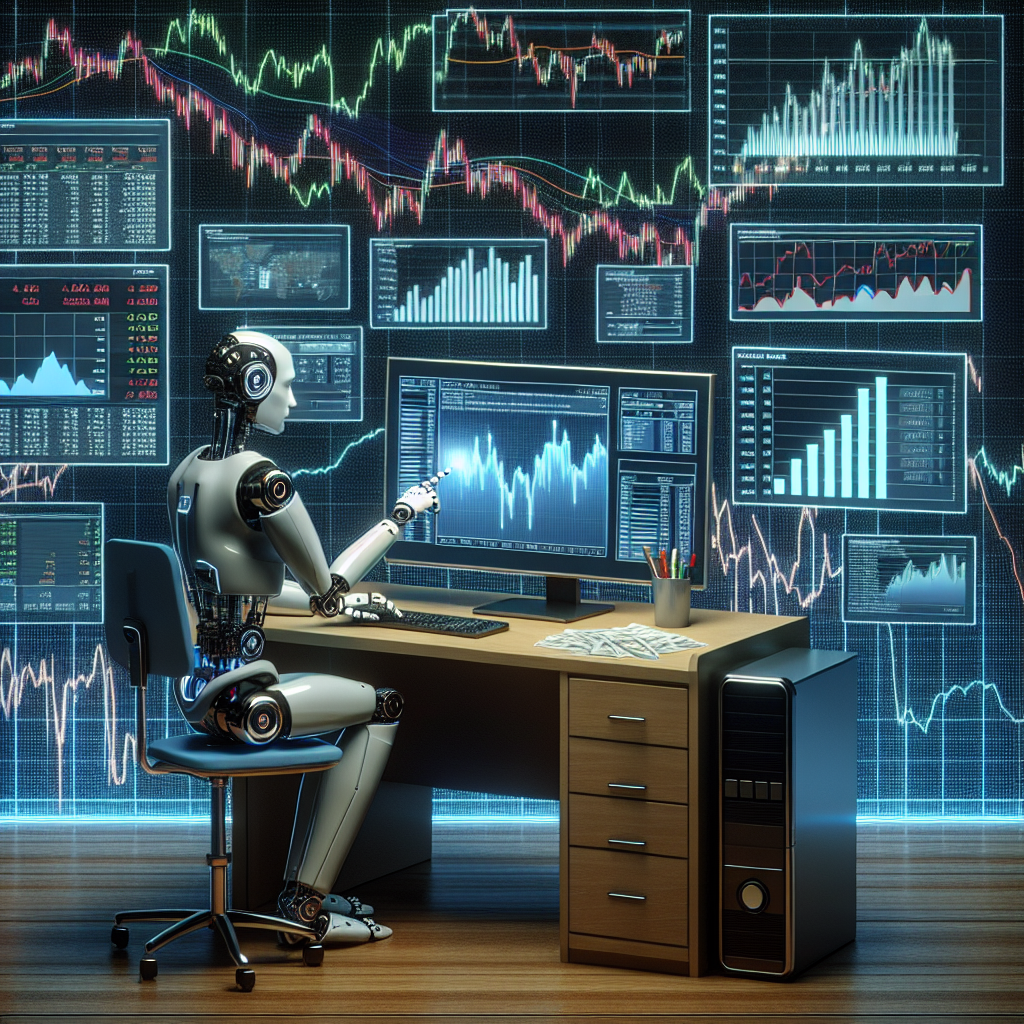The Pros and Cons of Using Automated Trading Software for Stock Trading
In today’s fast-paced world, technology has become an integral part of our daily lives. From ordering groceries online to controlling our home appliances with a simple voice command, technology has made our lives easier and more efficient. This same technology has also made its way into the world of stock trading, with the rise of automated trading software.
Automated trading software, also known as algorithmic trading or black-box trading, uses complex algorithms to analyze market data and execute trades on behalf of the user. This software has gained popularity in recent years, with many investors and traders turning to it as a way to potentially increase their profits and minimize their risks. However, like any other technology, there are both pros and cons to using automated trading software for stock trading.
One of the main advantages of using automated trading software is its ability to remove emotions from the trading process. Emotions such as fear and greed can often cloud a trader’s judgment, leading to impulsive and irrational decisions. With automated trading software, trades are executed based on pre-defined rules and parameters, eliminating the influence of emotions. This can be especially beneficial for new traders who may not have the experience or discipline to make sound trading decisions.
Another advantage of using automated trading software is its speed and efficiency. These programs can analyze market data and execute trades at a much faster pace than a human trader. This can be crucial in a fast-moving market where every second counts. Additionally, automated trading software can monitor multiple markets and securities simultaneously, which would be nearly impossible for a human trader to do on their own.
Furthermore, automated trading software can also help in diversifying a trader’s portfolio. By using different algorithms and strategies, the software can trade in various markets and securities, reducing the risk of relying on a single stock or market. This can also help in minimizing losses during market downturns, as the software can quickly adapt and adjust its trading strategies.
However, with all its advantages, there are also some drawbacks to using automated trading software. One of the main concerns is the lack of human oversight. While the software may be programmed to follow specific rules and parameters, it cannot account for unexpected events or changes in the market. This can lead to significant losses if the software is not regularly monitored and adjusted accordingly.
Another disadvantage is the potential for technical glitches or malfunctions. As with any technology, there is always a risk of errors or bugs that can affect the performance of the software. This can result in incorrect trades being executed, leading to financial losses. It is essential for traders to have a thorough understanding of the software and its capabilities to minimize the risk of technical issues.
Moreover, automated trading software can also be expensive. Some programs require a significant upfront investment, while others charge a monthly subscription fee. This can be a barrier for new traders or those with limited funds. Additionally, the cost of the software may outweigh the potential profits, making it a less attractive option for some traders.
In conclusion, automated trading software has its pros and cons, and whether it is suitable for an individual trader depends on their personal preferences and risk tolerance. While it can offer speed, efficiency, and emotion-free trading, it also comes with the risk of technical issues and lack of human oversight. It is essential for traders to thoroughly research and understand the software before incorporating it into their trading strategy. Ultimately, the decision to use automated trading software should be based on an individual’s trading goals and risk management strategies.
How to Choose the Right Automated Trading Software for Your Investment Goals

In today’s fast-paced world, technology has become an integral part of our daily lives. From ordering groceries online to controlling our home appliances with a simple voice command, automation has made our lives easier and more efficient. This trend has also extended to the world of finance, with the rise of automated trading software.
Automated trading software, also known as algorithmic trading or black-box trading, uses computer programs to execute trades in the financial markets. These programs are designed to follow a set of predetermined rules and algorithms, allowing them to make trades without human intervention. This technology has gained popularity in recent years, with many investors turning to automated trading software to manage their investments.
But can software really trade stocks for you? The answer is yes, but with some caveats. While automated trading software can be a powerful tool for investors, it is not a one-size-fits-all solution. Choosing the right software for your investment goals is crucial for success in the stock market.
The first step in choosing the right automated trading software is to understand your investment goals. Are you looking for short-term gains or long-term growth? Are you a risk-taker or a conservative investor? These are important questions to consider as they will determine the type of software that is best suited for your needs.
Next, you need to research and compare different automated trading software options. There are many software programs available in the market, each with its own unique features and capabilities. Some software may be more suitable for day trading, while others may be better for long-term investing. It is essential to read reviews, compare prices, and understand the features of each software before making a decision.
One crucial factor to consider when choosing automated trading software is its track record. Look for software that has a proven track record of success. This can be in the form of backtesting results or real-time performance data. It is also essential to consider the software’s risk management capabilities. A good automated trading software should have built-in risk management tools to protect your investments from significant losses.
Another important aspect to consider is the level of customization and control the software offers. Some programs allow for a high level of customization, allowing you to set your own rules and parameters for trading. Others may have a more rigid structure, limiting your control over the trading process. Depending on your investment goals and risk tolerance, you may prefer one over the other.
It is also crucial to understand the fees associated with using automated trading software. Some programs charge a flat fee, while others may have a commission-based structure. It is essential to calculate the total cost of using the software, including any additional fees or charges, to determine if it is a cost-effective option for your investment goals.
Once you have chosen the right automated trading software, it is essential to monitor its performance regularly. While the software may be designed to make trades on its own, it is still important to keep an eye on its performance and make adjustments if necessary. This will ensure that the software is aligned with your investment goals and risk tolerance.
In conclusion, automated trading software can be a valuable tool for investors, but it is not a substitute for proper research and due diligence. Understanding your investment goals, researching and comparing different software options, and regularly monitoring its performance are crucial for success in the stock market. With the right automated trading software and a sound investment strategy, you can potentially see significant returns on your investments.
Maximizing Profits with Software Trading: Tips and Strategies for Success
In today’s fast-paced and ever-changing stock market, many investors are turning to software trading as a way to maximize their profits. With the rise of technology and the availability of advanced trading algorithms, software trading has become a popular option for both novice and experienced traders. But can software really trade stocks for you? In this article, we will explore the benefits and limitations of software trading and provide tips and strategies for success.
First and foremost, it is important to understand what software trading is and how it works. Software trading, also known as algorithmic trading or automated trading, is the use of computer programs to execute trades in the stock market. These programs are designed to analyze market data, identify patterns, and make trades based on predetermined rules and strategies. This eliminates the need for human intervention and allows for faster and more efficient trading.
One of the main advantages of software trading is its ability to remove emotions from the trading process. Emotions such as fear and greed can often cloud a trader’s judgment and lead to impulsive and irrational decisions. With software trading, trades are executed based on data and predetermined rules, eliminating the emotional aspect of trading. This can lead to more disciplined and consistent trading, which can ultimately result in higher profits.
Another benefit of software trading is its speed and efficiency. With the use of advanced algorithms, software can analyze market data and execute trades in a matter of milliseconds. This allows for quick reactions to market changes and can potentially lead to better trade execution. Additionally, software trading can monitor multiple markets and stocks simultaneously, which would be nearly impossible for a human trader to do. This can provide a competitive edge in the market and increase the chances of making profitable trades.
However, it is important to note that software trading also has its limitations. While it can analyze data and execute trades at lightning speed, it is still reliant on the accuracy of the data it receives. If there are errors or delays in the data, it can affect the performance of the software and potentially lead to losses. It is crucial for traders to regularly monitor and review the performance of their software to ensure its accuracy and effectiveness.
Furthermore, software trading is not a one-size-fits-all solution. Different trading strategies and market conditions may require different algorithms and rules, and it is important for traders to constantly adapt and fine-tune their software to meet their specific needs. This requires a certain level of technical knowledge and expertise, which may be a barrier for some traders.
So, can software really trade stocks for you? The answer is both yes and no. While software can certainly execute trades on your behalf, it is not a substitute for a well-informed and strategic trader. It is important for traders to understand the fundamentals of the stock market and have a solid trading plan in place before relying solely on software trading. Additionally, regular monitoring and adjustments are necessary to ensure the software is performing effectively.
In conclusion, software trading can be a valuable tool for maximizing profits in the stock market. Its ability to remove emotions and execute trades quickly and efficiently can lead to higher profits. However, it is not a foolproof solution and requires constant monitoring and adjustments. Traders should use software trading as a supplement to their own knowledge and strategies, rather than a replacement. With the right approach and understanding, software trading can be a powerful tool for success in the stock market.

